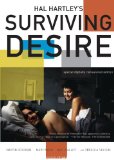| Reviews & Columns |
|
Reviews DVD TV on DVD Blu-ray 4K UHD International DVDs In Theaters Reviews by Studio Video Games Features Collector Series DVDs Easter Egg Database Interviews DVD Talk Radio Feature Articles Columns Anime Talk DVD Savant Horror DVDs The M.O.D. Squad Art House HD Talk Silent DVD
|
DVD Talk Forum |
|
|
| Resources |
|
DVD Price Search Customer Service #'s RCE Info Links |
|
Columns
|
|
|
Hal Hartley's Surviving Desire
THE FILM
"Listen pal, you can't waltz in here, use my toaster, and start spouting universal truths without qualification!"
In the early 1990s, I happened upon Hal Hartley's "Trust" on the shelf of my local video store. An impulse rental due to a fraudulent synopsis provided by the box-art design folks at Republic Pictures, finding "Trust" was pure serendipity, nudging me to investigate the curious, colorful world of independent film, back when the label meant bed sheet exhibition and a few bloodstains on the print. It brought about the Hal Hartley phase of my movie appreciation quest, which was stoked further by the offbeat short film, "Surviving Desire."
An American Playhouse production, "Surviving Desire" furthered Hartley's fascination with the cold mechanics of love, dreaming up a relationship between a caustic, questioning college professor named Jude (Martin Donovan) and his student Sophia (Mary Ward), an inquisitive, forward bookstore clerk who craves a romantic connection. Together they banter, trade philosophies, and work out their insecurities on the perilous path toward what they believe is love.
Experimental in structure, but operating from a pure Hartley blueprint, "Surviving Desire" represents the filmmaker massaging his droll twitches between his triumphant work on "Trust" and the equally intoxicating pull of 1992's "Simple Men." Running only 50 minutes in length, the picture sprints through this game of askew courtship at top speed, skillfully interpreting Hartley's metronome-tight dialogue as a verbal dance between two intellectuals attempting to suppress their magnetic attraction.
To Hartley, love is impossibly physical, soulfully demanding, and often embarrassingly mechanical (Rebecca Nelson appears as a homeless woman asking strangers to marry her), and the emotion provides the proper jolt of agitation as Jude and Sophia tango briefly with their paralyzing uncertainties. The film also erects a sturdy literary foundation, with an opening and closing centered on discussions of Dostoevsky, while the rest of the picture roots itself in written confessions and verbal jousting, communicated expertly by the porcelain Ward and Hartley stalwart Donovan.
THE DVD
Visual:
The full frame presentation is perhaps the best the film has looked to date, with a strong celluloid feel to the image, providing strong grain appearance and pronounced colors. It's a no-budget film made for public television, so the restoration effort here is solid for a product time typically washes away, with only a few instances of print damage.
Audio:
The Dolby Digital 2.0 track is a terrific mono effort, preserving the delicate frontal movement of the picture, while keeping specialized sounds alive to attain the appropriate feel of Hartley's vision. Music cues have a wonderful clarity, with a mid-movie outdoor performance sequence sustaining the streetwise ambiance.
Extras:
"Upon Reflection: 'Surviving Desire'" (11:08) corrals interviews from 2005 with Hal Hartley, Martin Donovan, and producer Ted Hope, who discuss artistic intent, creative inspirations, and the pain of keeping a crew together with zero money to spread around. It's amusing to see this group pulled back together, thought the absence of Mary Ward is felt.
Also included are two Hartley short films, "Ambition" (8:31) and "Theory of Achievement" (17:06), both from 1991.
FINAL THOUGHTS
Love heals, but it also harms. "Surviving Desire" handles the spectrum of troubling feelings with a deadpan delivery, but it remains insightful in an academic manner, reflecting Hartley's passion for the tense interplay of characters unable to crack the puzzle of human interaction. A near-silent dance sequence, cameo by the Hub Moore and The Great Outdoors, and a closer scored to the spare yearn of "Rue Des Jours" only help to process the developing greatness of Hal Hartley and his inspired cinematic voice.
|
| Popular Reviews |
| Sponsored Links |
|
|
| Sponsored Links |
|
|
| Release List | Reviews | Shop | Newsletter | Forum | DVD Giveaways | Blu-Ray | Advertise |
|
Copyright 2024 DVDTalk.com All Rights Reserved. Legal Info, Privacy Policy, Terms of Use,
Manage Preferences,
Your Privacy Choices | |||||||













